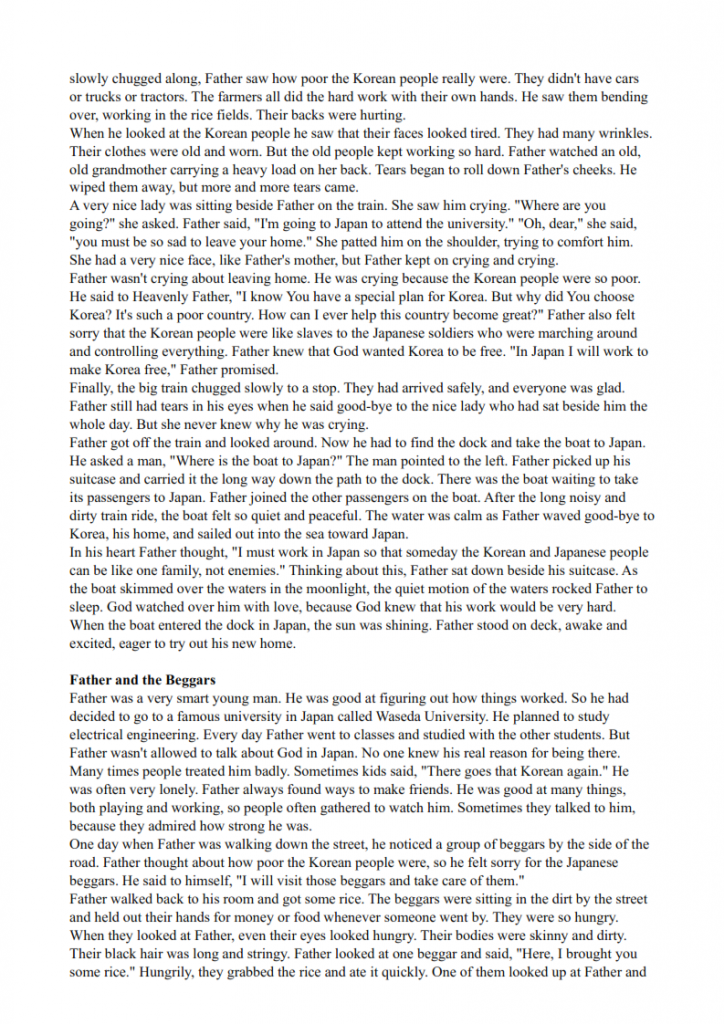Aim to know the situation of Koreans during the Japanese occupation
Aims
* to know the situation of Koreans during the Japanese occupation
* to learn that we are all brothers and sisters under God and that loving your enemy is the only way to bring enemies together
Materials
* Loving One’s Enemy, by Nora Spurgin
* Sun Myung Moon, the Early Years, by Michael Breen
* As a Peace-Loving Global Citizen, by Rev. Sun Myung Moon
* children’s worksheet
* matching pairs of cards with Jesus words
* visual aids – Father speaking with beggars, Japanese soldiers in Korea
Lesson Outline
1. Background information about the story
2. Tell the story
3. Questions to discuss
4. Activities – worksheet, memory game
5. Conclusion
6. Prayer
1) Background information about the story
Tell the children the situation in Korea in 1941.
* Korea was occupied by Japan between 1905 and 1945. Korean people suffered as the Japanese tried to stamp out their culture and language.
* Koreans were forced into the military, and made to work in Japan.
* Christians were imprisoned for refusing to worship at Shinto shrines and churches were banned.
* In 1944 Koreans were arrested for speaking Korean and were forced to take new, Japanese names
* Father was travelling under his new name, Emoto Ryumei. Emoto is a common Japanese surname. Ryumei is the Japanese pronunciation of the Chinese characters for Moon’s first name, Yong-myung.
* Today’s story is about when Father went to study in Japan.
2) Story
In 1941 Father went to Japan to study electrical engineering. Most Koreans hated the Japanese, because Japan was occupying Korea. But Father wanted to learn how to love his enemy. He became friends with the poorest people to try to understand their situation.
3) Questions to Discuss
* After reading, review the story by asking questions:
1) Why was Father crying on his train journey?
– He felt sorry for the Korean people. They were poor and lived a hard life. He saw farm workers looking tired, wearing old, worn-out clothes. They were also suffering because of the occupation by Japan.
2) What was his Japanese name?
– Emoto Ryumei
3) What did he study in Japan?
– electrical engineering
4) What did he want to do in Japan apart from study?
– help to make Koreans and Japanese friends
– learn to love his enemies
– support the Korean independence movement
5) How did he help the beggars?
– gave them rice, cut their hair
6) Why was it difficult for Father to live in Japan?
– he wasn’t treated with respect
– he often felt lonely
– he couldn’t talk about God
– Koreans had to do the jobs Japanese people didn’t want to do
7) How did he move coal so quickly?
– he got his friends to work together all night and they shared the money
8) What helped Father to love the Japanese?
– one man gave him extra money for delivering coal, which moved his heart
– Father’s landlady treated him like her son
– serving beggars helped him to understand their heart
9) We are all brothers and sisters under God, even if we seem to be enemies. Father showed that love and kindness can turn an enemy into a friend. However, it’s not always easy to forgive and love someone who has done something mean or wrong to you. Would you have been as forgiving as Father?
10) Do you think it would be easy to do what Father did? If you were Father, what might you have done to forgive and love the Japanese? Relate this to your own life.
11) Has someone said or done something to you that hurt your heart? Could you forgive them?
Was it easy? How did the person respond? Ask the children about their experiences
4) Activities
* Colour the worksheet picture and answer the questions.
* Play the memory game of Jesus’ words to emphasize that Father was a Christian. Jesus words influenced his desire to love his enemies. They can also inspire the children and show them what a deep understanding Jesus had about life. Which words of Jesus inspires the children the most?
5) Conclusion
Ask each person what they could learn from today’s lesson. Refer to the lesson aims:
*to know the situation of Koreans during the Japanese occupation
* They suffered as the Japanese tried to stamp out their culture and language.
* They were forced into the military, and made to work in Japan. Christians were imprisoned for refusing to worship at Shinto shrines and churches were banned. Koreans were arrested for speaking Korean and were forced to take new, Japanese names
*to learn that we are all brothers and sisters under God and that loving your enemy is the only way to bring enemies together.
– Father practised the words of Jesus that we should love our enemy
6) End with a prayer














